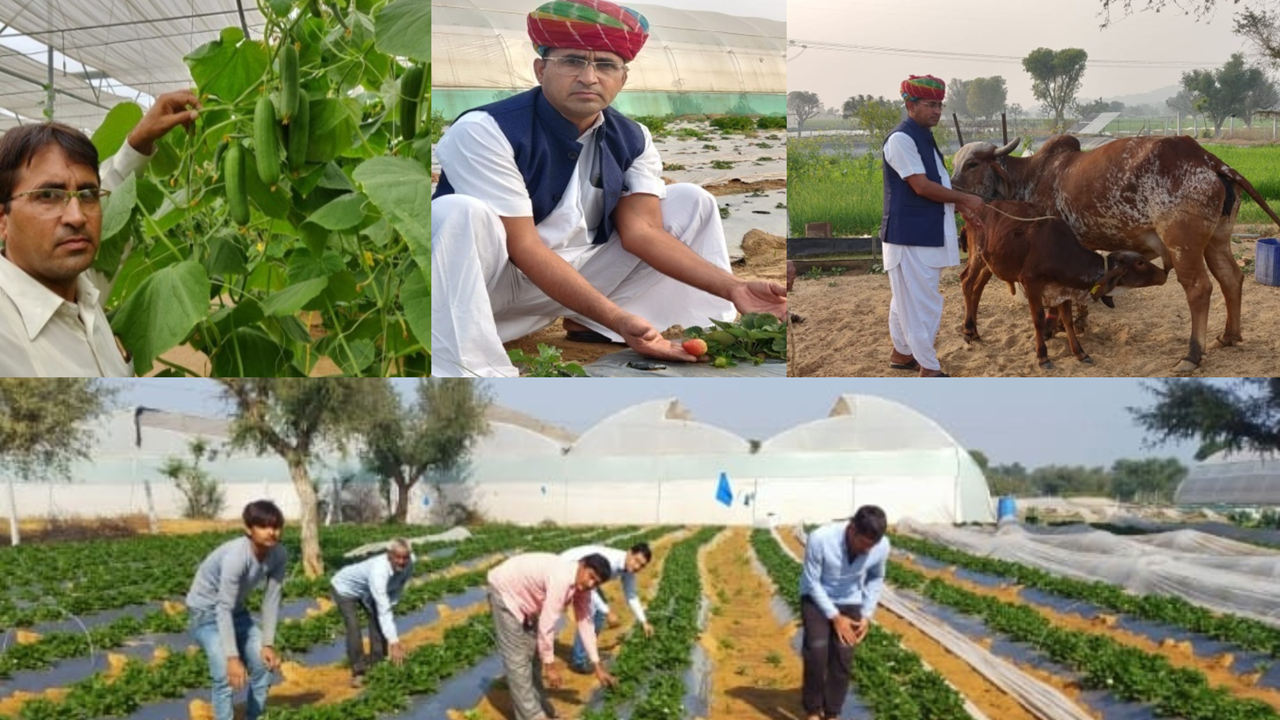
Rajasthan, known for its arid climate and limited water resources, presents significant challenges for agriculture. With its scorching temperatures and sparse rainfall, cultivating crops in this region is a tedious task. However, despite these obstacles, innovative farmers like Ganga Ram Sepat from Kalakh village, Phulera, Jaipur, have embraced organic farming and managed to earn an impressive annual income of 40 lakh rupees. Interestingly, he shares the sum with his two brothers. He has also been awarded the title of Millionaire Horticulture Farmer of India at the national level for cucumber cultivation by Krishi Jagran. Let's learn more about his inspiring journey and uncover the secrets behind his remarkable achievement. Read On.
First Step Towards Organic Farming
In 2012, Sepat started organic farming, a decision that would transform his life. It wasn't until 2018 that he officially registered his venture. Reflecting on his path, he recalls his earlier days of running a private school, where his passion for knowledge led him to delve into the pages of magazines and newspapers. He says, “It was here that I stumbled upon alarming reports of the rising incidence of cancer. Determined to understand the root cause, I discovered the reason was the heavy use of chemicals in conventional crop protection practices.” This revelation struck a chord with him, especially after witnessing his father-in-law battle cancer. It was then that Sepat felt compelled to honor his family's agricultural legacy by transitioning to organic farming, following in the footsteps of his father and grandfather.
Farming Techniques and Water Conservation Strategies
Sepat has approximately 4 hectares of land, where he cultivates cucumbers within polyhouses, employing minimal pesticide usage. He says, "A polyhouse offers an environment conducive to rapid insect and disease proliferation. To counteract this, I employ biorational chemicals and biocultures such as Pseudomonas and Trichoderma along with Bioagents like Beauveria bassiana and Metarizium Enisoply as crop protectants." Additionally, he diversifies his crops by cultivating exotic vegetables like broccoli, lettuce, china cabbage, and red cabbage, all sourced from foreign seeds that he replicates. Further, Sepat emphasizes the importance of water conservation in his village, where water scarcity prevails. To address this challenge, he constructed a farm pond capable of holding 1 crore liters of water. For irrigation, the farmer has opted for a drip irrigation system, reserving the use of sprinkler systems to a minimum. He underscores that drip irrigation is the primary method employed, highlighting its efficiency and effectiveness in water utilization.
Community Collaboration and Government Support
Sepat is an active member of the FPO named Kalakhagro Navfed Farmers Producer Company Limited, which comprises approximately 350 farmers. Together, they have established a shop offering crop protection solutions and inputs like biocultures and seeds through the FPO. Sepat mentions that he has availed government subsidies for both the farm pond and polyhouse, further enhancing his farming endeavors.
Integrating Fish Culture and Livestock
In addition to conventional farming practices, Sepat practices integrated farming, incorporating aquaculture into his operations. The waste from the fish serves as a natural fertilizer, enriching the soil and enhancing crop growth. Moreover, the presence of fish helps in reducing algae and purifying the water. Sepat also keeps cows, goats, and other livestock, exemplifying a holistic approach to agriculture through integrated farming techniques.
Balancing Tradition and Technology
Sepat wishes to share a message with fellow farmers, emphasizing the importance of adopting sustainable farming practices. Drawing from his experiences and those of his peers, who engage in farming within protected environments, he highlights their collective efforts in creating what is now known as "Mini Israel," boasting approximately 1500 poly houses. These innovative setups not only feature poly houses but also incorporate solar plants, drip irrigation systems, and other modern technologies.
While embracing the latest advancements, Sepat remains grounded in traditional farming techniques. He advocates for a balanced approach, encouraging farmers to integrate modern methods with time-tested practices. Diversifying crops is key, as monocropping poses risks to income stability throughout the year. Additionally, he suggests incorporating poultry, livestock, and other auxiliary ventures to enhance farm sustainability and profitability.










